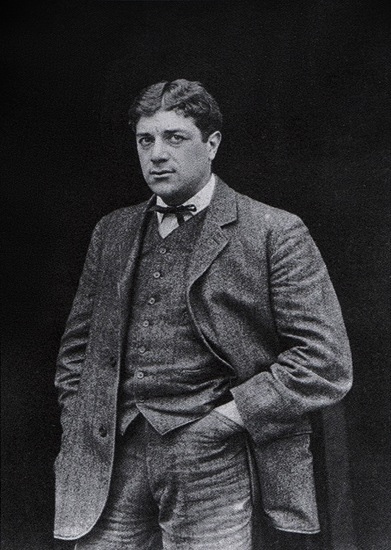“L'Arte è fatta per turbare, la Scienza rassicura.”
da Il giorno e la notte, a cura di M. Revol Cappelletti, Robin Edizioni, 2002
Georges Braque /ʒɔʁʒ bʁak/ è stato un pittore e scultore francese, che assieme a Pablo Picasso è stato l'iniziatore del cubismo. Il cubismo analitico nasce tra il 1909 e il 1910, grazie a Picasso e Braque che si rendono conto che, spezzando troppo la superficie pittorica, i suoi singoli frammenti non sono più ricomponibili virtualmente e l'opera si avvicina sempre più ai caratteri dell'astrattismo, infatti i cubisti non vogliono perdere la riconoscibilità dell'oggetto. Queste idee le porteranno nel cubismo sintetico, evoluzione dell'analitico a partire dal 1912, fino al 1914, quando Braque verrà richiamato al fronte.
Con la collaborazione di Juan Gris elaborano una serie di tecniche per uscire da questo paradosso in cui sono incappati portando alle estreme conseguenze la loro tecnica di rappresentazione del reale. Introducono nel quadro frammenti di realtà, di oggetti reali combinati alle parti dipinte , utilizzano mascherine con numeri o lettere ; inseriscono "trompe l'œil" e riproducono l'effetto delle venature del legno con la tecnica del pettine passato sul colore fresco.
Inoltre si assiste al ritorno del colore e soprattutto il processo dell'opera non ha inizio attraverso l'osservazione del reale, ma si creano sulla tela forme geometriche semplici variamente composte, in intersezione, orientate in vario modo e solo in un secondo momento queste suggeriscono oggetti reali. La realtà viene dunque sintetizzata, creata nell'immagine. Gli oggetti sulla tela non sono più copia del reale, esistono nel momento in cui vengono concretizzati nell'immagine pittorica, di essi c'è solo il concetto formale.
Wikipedia

“L'Arte è fatta per turbare, la Scienza rassicura.”
da Il giorno e la notte, a cura di M. Revol Cappelletti, Robin Edizioni, 2002
“Evidence exhausts the truth.”
as quoted in Conversations with Samuel Beckett and Bram van Velde, ed. Charles Juliet, First Dalkey Archive edition, 2009, London and Champaign pp. 60-61
posthumous quotes
“Whatever is valuable in painting is precisely what one is incapable of talking about.”
two quotes by Braque, in 'Les Problèmes de la Peinture', interview with Gaston Diehl Paris 1945
1921 - 1945
Origine: 1946 - 1963, Cahiers d'art', 1954, p. 16
Origine: posthumous quotes, Braque', (1968), p. 55
Origine: posthumous quotes, Braque', (1968), p. 30 - Braque's quote from the book, written by John Rusell, London 1959
“It is the act of painting, not the finished painting.”
1946 - 1963, interview with John Richardson' (1957)
Origine: 1946 - 1963, In conversation with Dora Vallier' (1954), p. 264 - Braque's quote is referring to the early common starting years of Cubism in Paris with Picasso, ca. 1907 -1910
Origine: 1946 - 1963, In conversation with Dora Vallier' (1954), p. 265
Origine: 1946 - 1963, In conversation with Dora Vallier' (1954), p. 264
1946 - 1963, interview with John Richardson' (1957)
Origine: 1946 - 1963, In conversation with Dora Vallier' (1954), p. 265
Braque is referring in this quote to the early common start of Cubism ca. 1907 -1910, in Paris with Picasso
Origine: 1946 - 1963, In conversation with Dora Vallier' (1954), p. 265
1946 - 1963, interview with John Richardson' (1957)
1946 - 1963, interview with John Richardson' (1957)
Quote by Braque, from 'Le Monologue du Peintre', George Charbonnier, Paris 1959
1946 - 1963
[Braque refers to their common years in Paris, c. 1907 - 1912]
Origine: posthumous quotes, Braque', (1968), p. 10
Quote from: 'Entretien avec Jauqes Lassaigne' - 1961; as quoted in Futurism, ed. Didier Ottinger; Centre Pompidou / 5 Continents Editions, Milan, 2008, p. 94
1946 - 1963
1946 - 1963, interview with John Richardson' (1957)
Quote of Braque to John Richardson, in 'Braque Discusses His Art', in 'Realités', no. 93, August 1958, p. 28
1946 - 1963
1946 - 1963, interview with John Richardson' (1957)
Origine: posthumous quotes, Braque', (1968), p. 41
Quote of Braque, late 1908; as cited in The wild men of Paris, Gelett Burgess, https://monoskop.org/images/f/f3/Burgess_Gelett_1910_The_Wild_Men_of_Paris.pdf in 'The Architectural Record', p. 405, May 1910; as cited in Braque, by Edwin Mullins, Thames and Hudson, London 1968, p. 34
1908 - 1920
the letters
Origine: posthumous quotes, Braque', (1968), p. 68
Origine: 1908 - 1920, quotes from Artists on Art...(1972), p. 422 - Braque's quote, Paris 1917
Origine: 1908 - 1920, quotes from Artists on Art...(1972), p. 423 - short quotes by Georges Braque on 'Means' - Paris, 1917
Origine: 1946 - 1963, Cahiers d'art', 1954, p. 14 - In: 'Braque, la peinture et nous'
Origine: 1946 - 1963, In conversation with Dora Vallier' (1954), p. 265
Braque admired Corot and frequently used Corot's young country-ladies as models, for instance in his painting 'Souvenirs de Corot' he made in 1922/23
Origine: 1921 - 1945, p. 96 - quote of Braque from 'Cahiers d'art', No. 10, 1935, ed. Christian Zervos - quote of Braque is referring to Corot's impact on his painting art